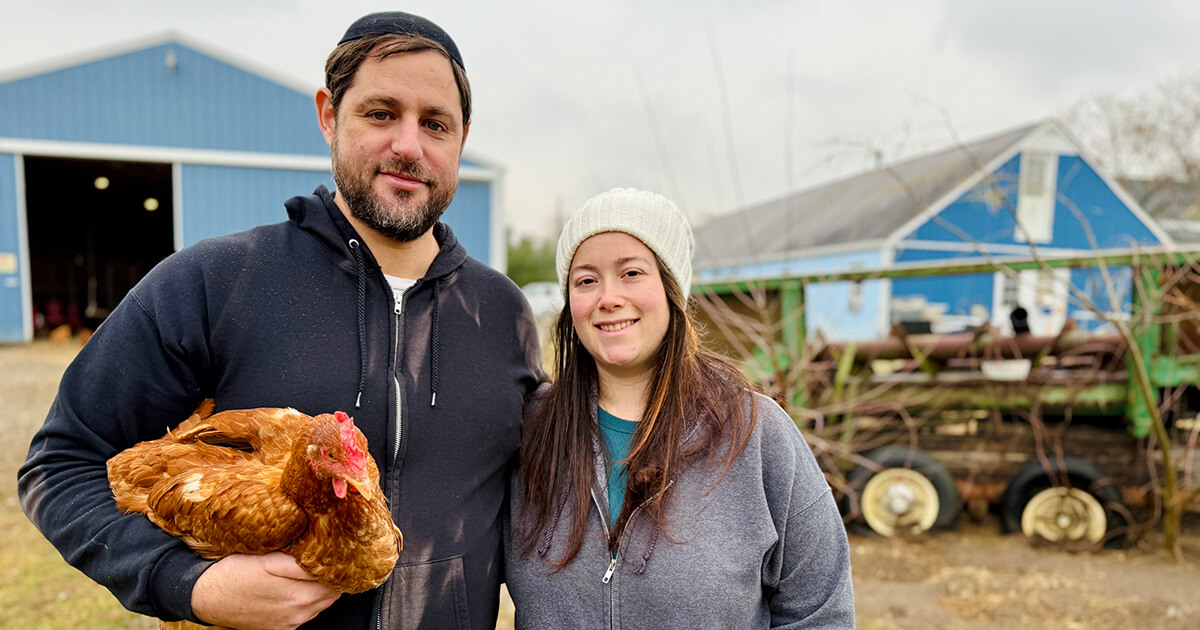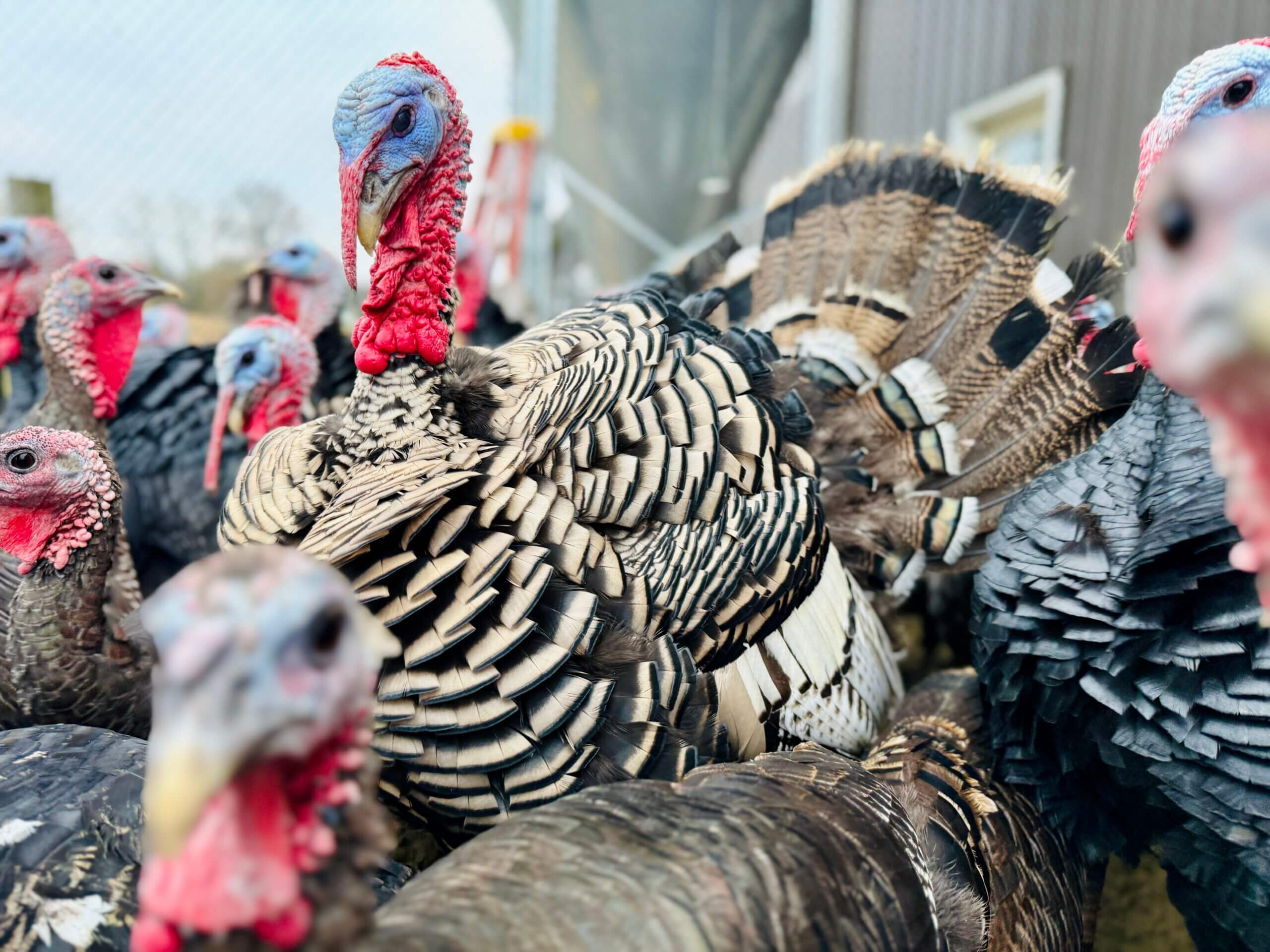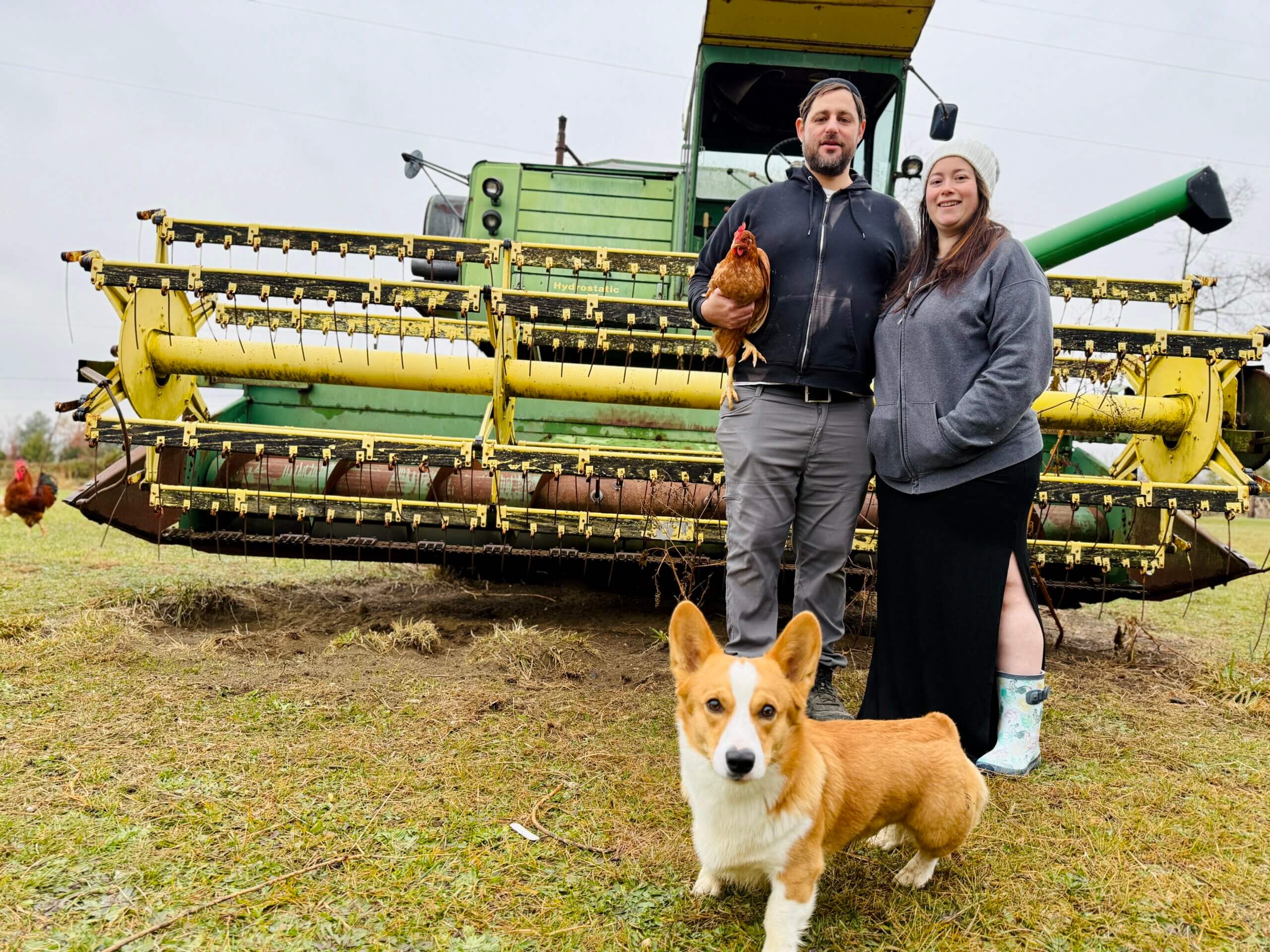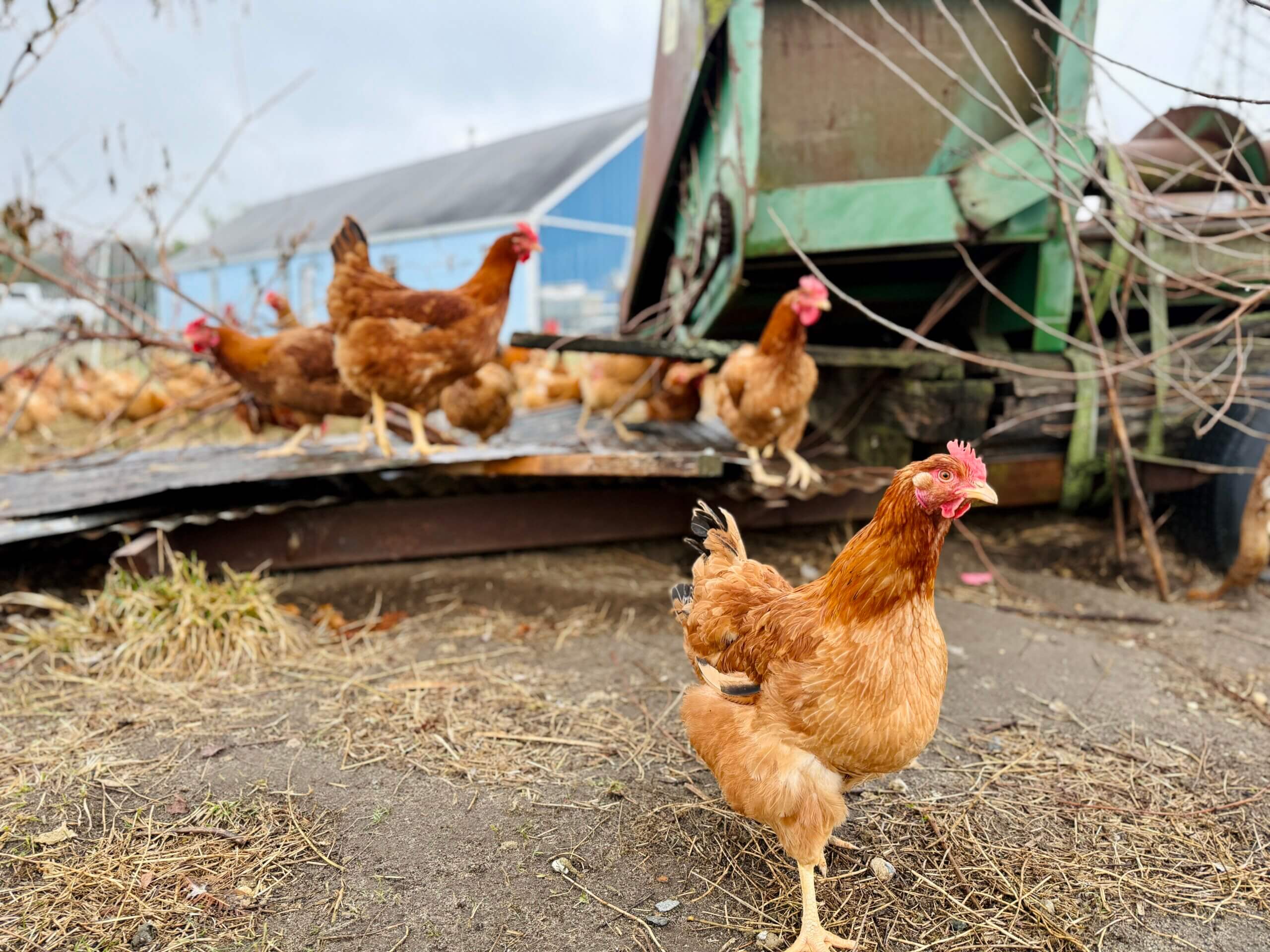This Jewish family is betting the farm on Thanksgiving turkeys like bubbe cooked
At Chosen Farms, a kosher heritage turkey takes six months to raise and costs about $150

Yadidya and Miriam Greenberg run Chosen Farms, a kosher heritage poultry operation. Photo by Benyamin Cohen
Benyamin visited Chosen Farms in the lead-up to Thanksgiving, on one of those November afternoons when the sky goes gray at lunch and never recovers.
NARVON, PA – A thick, rolling gobble fills the barn in Lancaster County, Pennsylvania as several hundred turkeys stand shoulder to shoulder, shifting in waves like a loud, feathered mob.
They don’t know it, but they’re part of a gamble — one that could reshape the kosher poultry business in America. The question is: Will enough people want a Thanksgiving turkey, at a price between $140 and $400, that tastes like bubbe’s did?
Supermarket poultry has become a fixture of the Jewish kitchen — easy to find, easy to cook, easy to forget. As organic and ethically raised meats gain traction across the country, many kosher families are still left with factory-farmed options that claim tradition but taste like compromise.
This flock belongs to Chosen Farms, a kosher heritage poultry startup run by Yadidya and Miriam Greenberg, a husband-and-wife team who split their work between two states: turkeys here in Lancaster County with help from an Amish farmer, and chickens on 30 acres in Pemberton, New Jersey.
Once the turkeys reach market weight, they begin a Thanksgiving relay — first to a kosher processor in upstate New York, then to Pemberton to be frozen and packed. Labels come off the printer like boarding passes, rattling out destinations: California. Colorado. Florida. Nevada. New York. Orders pile up like suitcases in an airport the day before the holiday.
These are heritage birds — the kind that existed before industrial farming redesigned poultry around speed and uniformity. They come from older bloodlines that could walk, flap their wings and develop muscle over time. Today’s supermarket birds are bred to grow fat fast, their skin stretched thin over rapidly expanding bodies. They arrive like something delivered by algorithm. Heritage birds arrive with history.

The turkeys live twice as long as their grocery store counterparts. They keep the genetics, and much of the flavor, of the past. If you want your chicken soup to taste like your bubbe’s version, you start with one of these.
As a teenager, Miriam volunteered on farms in Maryland and later trained as a classical chef in New York. She speaks about modern poultry with the bluntness of someone who has tasted too much of it. “They neutered all the flavors. It just tastes like mush,” she said.
Heritage birds, she insists, give you something more flavorful. “It’s like tasting butter after a lifetime of margarine.”
Heritage breeds and Hanukkah goose
Miriam isn’t the only one making the case for flavor. Gidon van Emden, CEO of Kol Foods, which specializes in kosher grass-fed beef, lamb and pasture-raised chicken, has seen growing curiosity about heritage breeds in the kosher market. Consumers tell him the difference is noticeable immediately.
Van Emden believes the kosher market is hungry — not just for cleaner food, but for food that feels intentional. “If you mistreat the animal — bad feed, bad genetics — it’ll taste more watery,” he said.
He and Yadidya go back years. Greenberg taught him how to be a shochet, a butcher. Now, Kol Foods and Chosen Farms are among the few companies trying to expand what kosher poultry can be.
Yadidya bought the Pemberton property in 2022, and soon after married Miriam. The pasture is in the same swath of South Jersey where Holocaust survivors resettled and rebuilt their lives running chicken farms.
These day, in the kitchen, Yadidya boxes frozen turkeys — lining cardboard with insulated wrap, dropping in ice packs and sealing each shipment with a strip of tape. Their sukkah from last month’s holiday still stands in the yard, a reminder that the Jewish calendar doesn’t always make room for farm schedules. Their two-year-old brown herding dog, Peanut Butter, zigzagged between the chickens, nipping at their heels.

Chosen Farms sold its first batch of kosher heritage turkeys last year. It was a modest 20 birds. This year, they tripled that to 60. There’s no marketing budget, no social media campaign. Orders came in online by word of mouth, passed between butchers, rabbis, chefs and families looking for something better than the standard frozen brick with a pop-up timer.
Not all of their orders are for November. Yadidya pried open a freezer and revealed rows of heritage geese. The traditional Ashkenazi “Hanukkah goose” was once a staple dish in Eastern Europe, especially for Jews who couldn’t afford beef. Its rendered fat, known as schmaltz, became the secret weapon for frying latkes.
“We’re one of the only places in the country raising and selling kosher geese,” Yadidya said. Goose requires specialized equipment to pluck, and at $30 a pound, it’s not exactly an impulse buy. But Greenberg said demand returns every winter, a culinary echo of an older Jewish kitchen.
Farm life, Jewish life
Living on a farm doesn’t mean leaving Jewish life behind. The Greenbergs chose Pemberton precisely because it keeps them connected. They’re 30 minutes from Cherry Hill and Lakewood, both home to large Orthodox communities and kosher restaurants. There’s a mikvah nearby, and a daily minyan within a 20-minute drive. “There are farmers who move two hours away from Jewish life and then struggle,” he said. “I didn’t want that life. We paid more to be close.”
Friends drive in to spend Shabbat with them. In the summer, Jewish camping groups pitch tents by the trees. “We’re far enough to have space,” Yadidya said, “but close enough to still feel part of something.”
Chosen Farms isn’t an anomaly. It’s part of a small but growing movement of Jews choosing to make their living in agriculture. The Jewish Farmer Network, which began in 2017, now counts 1,800 farmers across 46 states. Some run educational farms for school trips, but others simply farm. No workshops. No signage. Just soil, livestock and spreadsheets.
“When Jewish people enter agriculture, it often feels like they’re departing from Judaism,” said Shani Mink, the group’s co-founder and executive director. “But we try to show that it can actually be a deeper encounter with it — because at its core, Judaism is agrarian.”

The Greenbergs’ farm still feels young — part vision, part construction site. They’re hoping to add heritage ducks next year, starting with the Silver Appleyard breed, which currently has no kosher supplier. A small curbside farm stand is in the works, where they could sell eggs, meat and Miriam’s sourdough bread.
The Greenbergs, as is their tradition, are hosting Thanksgiving on the farm with visiting family and friends. The turkeys will be their own, of course. Peanut Butter will make his rounds.
In a few days, ovens will preheat. Football games will hum in the background. Parade balloons will float past Macy’s like oversized guests. And somewhere between the gobbling and the grace after meals, one Jewish farm will find out whether a taste from the past still belongs to the future.

















